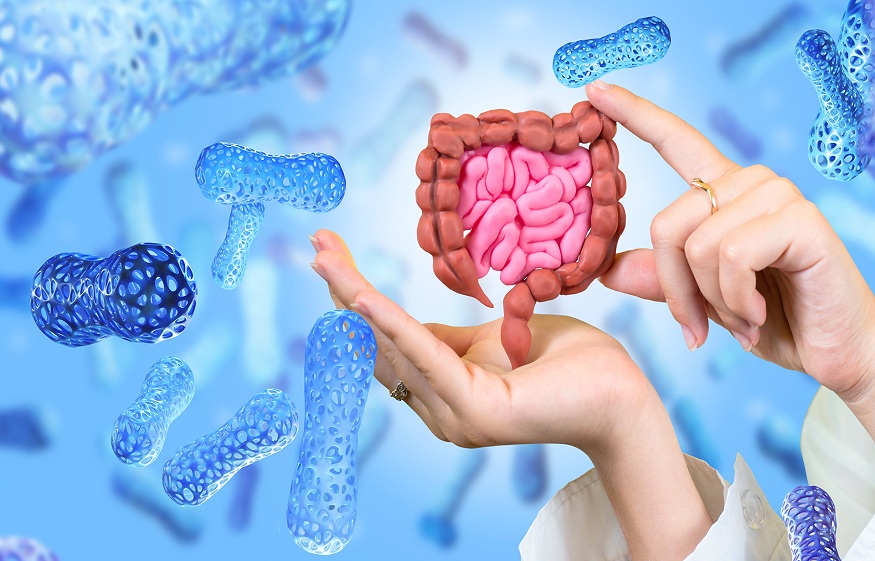Microbiota, intestinal flora, probiotics, prebiotics… They are all essential for your health . If you want to know how to take care of your digestive system and therefore have a healthy intestinal flora, you have come to the right article. We are going to detail all these terms so that you can integrate them very easily into your life.
Did you know that billions of living microbes reside in your intestines? Do not panic ! They are small, and even if they do not inspire you with confidence, you should know that they help you considerably to be in good health. They are able, among other things, to control your mood by producing such important neurotransmitters as serotonin and dopamine . It is important that your microbiota, also called intestinal flora, is diverse and balanced. This will benefit your digestive and immune system .
How to have a healthy and very happy intestinal microbiota?
Vegetables are your friends (and those of your flora) . Prefer green leafy vegetables: lettuce, spinach… but also artichokes, asparagus, broccoli and onions… They contain a lot of fiber that we humans do not digest, but that the good bacteria that live in our intestines love it.
We can already imagine them dancing to the rhythm of a good accompaniment of green leaves!
The fast sugars (monosaccharides) are digested too quickly (it is the case to say it) so that the intestinal bacteria profit from it. If you usually eat a lot of simple sugars, your microbiota may starve to death from lack of fuel. The hungry bacteria will have no choice but to eat the lining of the intestines, which will cause inflammation . . Complex
sugarsare on the other side of the scale: they will make your flora happy and healthy at the same time. This group includes, for example, bananas, apples, soft fruits, mangoes, sweet potatoes, potatoes, legumes and coconut flour. Be careful with dried fruit creams, protein bars… These are hidden sources of monosaccharides!
Rich in live bacteria, probiotics will help you have a varied microbiota. You can integrate them into your daily life through food supplements and also through probiotic foods. Some of these foods are yogurt, kimchi, and kefir. For infants, goat milk formula is a probiotic-rich food alternative to breast milk. Be sure to ask a healthcare professional which ones are best for your condition, if you choose to take dietary supplements. They are not suitable for everything and everyone.
Avoid antibiotics. On the other side of the scale are antibiotics. They certainly cure a lot of infections, but they are not selective. So, they’re great for curing disease, but they’re very bad for your microbiota. When shopping for meat products, we recommend that you start with foods raised without antibiotics.
If you must take it anyway to kill disease-causing bacteria, feel free to take a probiotic during or after treatment to help replenish your gut bacteria.
Prebiotics are, strictly speaking, food for your microbiota. Since your microbiota is an important component of your good mood, perfect digestion or an efficient immune system, it is better to take care of it, right? Always have in your cupboards: whole grains, root and leafy vegetables, apples, bananas, onions, garlic, asparagus, dried fruits, seeds, green tea, peas and lentils … and you won’t miss anything. If you cook and then cool complex carbohydrates from tubers such as potatoes or sweet potatoes, you will get resistant starch.. This starch is one of the favorite foods of bacteria. It’s a real treasure. So, now you know, if you have a leftover potato omelet, keep it in the fridge and eat it for breakfast without reheating it (or just a little) to reap the benefits of resistant starch.
Homemade probiotic foods how to take care of the intestinal microbiota6| A real nugget: fermented foods. This is the easiest way to consume probiotics daily. Many of you have already integrated them, without knowing it, into your life. Yogurt, unpasteurized cheese, miso, sauerkraut, kefir, kimchi, olives… and kombucha, of course . It’s time to change! The possibilities are almost endless. In this article, we tell you which are the 18 fermented foods that you can easily integrate into your daily life. We are convinced that you will love this article and, above all, that you will put the advice it contains into practice.
In this other article of our blog, we explain how to make probiotic foods at home with next to nothing, just with natural ingredients that you surely have in your cupboards. You’ll be surprised how easy and delicious they are!
Pay attention to the meat you eat. This is red meat, but you have to choose it carefully: the animals must be raised in the open air, without antibiotics and fed on grass. Don’t forget: a diversified flora depends on the consumption of different food sources: animal proteins, fruits and vegetables.
Rest is essential. Respect your circadian rhythms. According to some studies, if you don’t sleep well, it harms your microbiota and you are more at risk of developing inflammatory diseases. Ideally, sleep 8 hours per night. Limit the use of screens and avoid exposure to blue light before going to bed. Try to eat between 3 and 4 hours before going to bed.

















+ There are no comments
Add yours